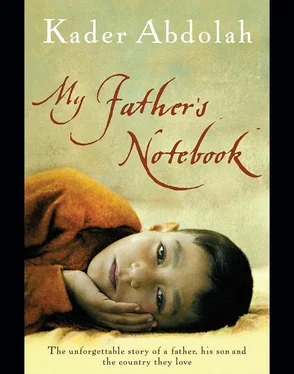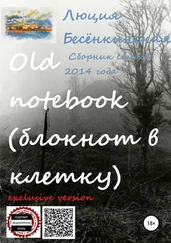The men all shouted in chorus, “ Allahom salla ’ala Mohammad wa ahl-e Mohammad [Peace be upon Muhammad and all of his descendants].”
Since Ishmael was Aga Akbar’s son, he was allowed to hear the story in greater detail. By then, several older family members, including Kazem Khan, had died. On one of his visits to Saffron Mountain, his elderly aunt invited him in.
How old had he been? Fifteen? Sixteen? At that time, he’d been making frequent visits to his father’s village. He’d spent the entire summer there, in his family’s summerhouse. He wanted to know more about his father’s past.
“Ishmael, my boy,” his elderly aunt said as he stepped into the hall, “give me your hand. Come in, my boy.”
She squeezed his hand and stared at him with unseeing eyes, as she expressed her admiration for her nephew’s son by uttering God’s words, “ Fa tabaraka Allah al-husn al-khaleqan [And God was pleased with the beauty of the one he had created].” (According to the Holy Book, God fell in love with his own creation.)
Ishmael was not just a son, but the son the whole family had been waiting for. They’d prayed that he would be big and healthy enough for his father to lean on. He’d been a godsend, exactly what everyone had been hoping for. Surely it had been Allah’s will.
Auntie took Ishmael into the courtyard.
“Before I die, I have something to tell you about your father’s wedding. Come, let’s and go and sit over there. I’ve spread out a carpet in the shade of the old walnut tree.”
She leaned back against the trunk and said, “What happened is this, my boy. I stuck a roll of yellow opium in my bag and went off to the matchmaker’s with the other women to find a wife for your father. That was wrong. I shouldn’t have done that.”
“Why not?”
“We failed to carry out the job properly, which is why we were punished by God.”
“Punished! Why?”
“Because we forgot that God was watching over your father. We insisted that he get married. We were behaving as if we didn’t believe in God, as if we didn’t trust Him, as if He had forsaken your father. And we were punished for that reason.”
“I don’t understand you.”
“The women escorted the bride and her seven mules from the village of Saruq to your father’s house. I placed her hand in your father’s hand and led them to the bedroom. I was the woman who was hiding behind the curtains.”
“Hiding behind the curtains?”
“It was the custom back then. I was supposed to watch in secret and see if everything went all right. To see if the woman … Oh, never mind, my boy. If only someone else had stood behind those curtains instead of me!
“I listened and sensed that something was wrong. Though I didn’t know what the problem was, I had the feeling that God was somehow displeased.
“Your father went to bed with his bride. He was strong, he had such broad shoulders. I could hear him , but not her. No movement, no words, not even a sigh, a moan, a cry of pain, nothing, absolutely nothing.
“But the marriage had been consummated, so I tiptoed out and went over to the other house, where I signalled to Kazem Khan that the celebration could begin.
“Everyone cheered, everyone smoked and ate, and we celebrated for seven days. But we knew that God was displeased with us. And that was my fault.
“I was the oldest, I should have known better. I should have kept my eyes open and bided my time. I should have told everyone not to be in such a hurry.”
“How come?”
“I was worried. I don’t know why. I hadn’t seen any sign of the bride. After all, she’s supposed to show herself. To stand by the window or smile or open the curtains. But no, she didn’t do a thing.”
“Why are you telling me all of this? Are you talking about my mother?”
“No, my boy. Let me finish. On the seventh night, your father went to bed with his bride as usual. I was asleep in another room, since I was supposed to stay near them for the first seven nights. In the middle of the night, I heard loud footsteps. Your father burst into the room. It was dark, so I couldn’t see his face. He uttered a few choked sounds. I didn’t know what he was trying to say, but I knew it was serious. I got out of bed and led your father into the courtyard, into the moonlight. What’s happening? ‘Cold,’ he gestured. ‘The bride is cold.’ I raced into the bedroom and held up the oil lamp so I could see her face. She was as cold as marble, my boy. She was dead.”
“Really?” Ishmael said in surprise. “So my mother wasn’t Father’s first wife?”
“No.”
“Why didn’t anyone ever tell me this?”
“I’m telling you now, my boy. There was no point in telling you before.”
Years later, Ishmael came home one night from Tehran and said to his father, “Come! I want to show you something.” He took a picture of a young woman out of his bag and handed it to Aga Akbar.
“Who is she?” his father signed.
“Don’t tell anyone,” Ishmael said, “but I might marry her some day.”
Aga Akbar studied the picture. He smiled and gestured: “Very pretty. But be careful! Check her out. Listen to her lungs. Make sure they’re working all right, make sure she breathes properly. I, I can’t hear, but you can, you have good ears. Healthy lungs are important.”
“Don’t worry. I’ve listened. She has healthy lungs.”
“And her chest? Does she have pain in her chest?”
“No, her chest is fine, there’s no pain.”
“Her arms?”
“Fine.”
His father smiled. “Check out her stomach, too.”
That evening was the first time Aga Akbar had ever talked to Ishmael about his first wife. He told him that the bride had had aches and pains all over. She’d had some kind of disease in her chest, in her lungs. He still didn’t know exactly what. “A woman’s breasts should feel warm, my boy, not cold. No, they should never feel cold.”
Persians are always waiting for someone.
In Persian songs, they sing about the Messiah,
the one who will come and set them free.
They wait in their poetry. They wait in their stories.
But in this chapter, the one they wait for is in a well.

If you face the cave, you can see Saffron Mountain’s peak to the right and a long range of brownish-yellow mountains to the left. There’s also an odd-looking spot that immediately catches your eye. Particularly if this is the first time you’ve climbed Saffron Mountain, you’ll notice it the moment you look in that direction.
It’s almost impossible to reach this spot. If you’re standing beneath it, the sun is so bright that all you can see is a craggy rock face. Rain, snow and frost have given it a miraculous shape. “Miraculous” and “sacred” are the words you automatically associate with this spot. At the bottom of this mysterious rock face is a natural well, a deep depression probably created by an erupting volcano.
This well is of special significance to Muslims.
For centuries, Shiite Muslims have been waiting for a Messiah, for the Mahdi, since he is a naji , a liberator. On this point, the Shiites differ greatly from the Sunnis. The Shiites believe that the Prophet Muhammad was followed by twelve imams. The twelfth successor — and, according to the Shiites, the last of the pure ones — was called Mahdi. To be precise, he was called Mahdi ibn Hassan Askari.
Mahdi was the son of Hassan, and Hassan was the son of Hadi, and Hadi the son of Taqi, Taqi the son of Reza, Reza the son of Kazem, Kazem the son of Sadeq, Sadeq the son of Baqir, Baqir the son of Zayn al-’Abidin, Zayn al-’Abidin the son of Hussein, Hussein the brother of Hassan, and Hassan the son of Ali. And Ali was the son-in-law of the Prophet Muhammad.
Читать дальше













